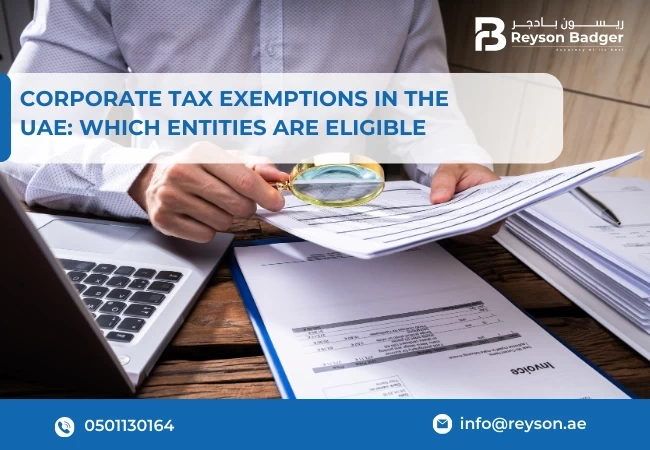Corporate Tax Exemptions in the UAE: Which Entities Are Eligible?
Written By Akshaya Ashok, Reviewed By Retheesh R S
Published on 06/12/2024

Many businesses operating within the UAE began to assess their tax liabilities as the UAE delivered federal corporate tax in 2023. Though the standard rate is 9% on profits over AED 375,000, various exemptions have been introduced to maintain its position as a global business hub. This blog discusses which entities qualify for these exemptions and what conditions must be met.
The UAE's tax law for businesses finds a middle ground between being competitive and fair. Small businesses and startups are relieved with a 0% tax on profits of up to AED 375,000. On the other hand, large entities have to face a flat 9% unless specific exemptions apply.
Entities Eligible for Corporate Tax Exemption
- Government and Government-Controlled Entities: Corporate tax exemptions apply to both federal and local government entities along with their departments, agencies, and institutions. This exclusion does not apply to authorized commercial operations carried out by these organizations.
- Non-Extractive Natural Resource Businesses: Those that operate in non-extractive activities, such as those involving natural resource management, can also enjoy exemptions depending on whether they are compliant
- Public Benefit Entities: Organizations involved in charitable, cultural, or community-focused work can be eligible if they are included in Cabinet Decision No. 37 of 2023 and fulfill the required criteria.
- Qualifying Pension and Social Security Funds: Both public and approved private pension and social security funds can seek exemption status from the Federal Tax Authority (FTA) if they meet the required criteria.
- Qualifying Investment Funds: REITs and other specific funds are eligible for exceptions if they satisfy the criteria outlined in Article 10 of the Corporate Tax Law.
Conditions for Exemption Eligibility
To qualify for or keep exemption status, organizations must meet specific requirements:
- Registration with the FTA: Exempt entities are required to register for Corporate tax
- Status Exemption Declaration: Entities exempted must periodically provide declarations confirming their exemption status.
- Compliance with Governance Standards: Upholding transparency and fulfilling reporting requirements is essential.
Procedure for Requesting Exemptions
Organizations that meet the requirements must adhere to these instructions:
- Turn in an application along with the necessary paperwork to the FTA.
- Show that you are following all requirements outlined in decisions made by the minister and cabinet.
- Wait for FTA approval, which could undergo regular evaluations or extensions.
Special Tax Reliefs in UAE Corporate Tax:
Assistance for Small Businesses
- A tax compliance reduction is available for revenues under AED 3 million.
- This is relevant for both startups and small and medium-sized enterprises.
Intra-Group Transactions
- Transferring assets and liabilities between group entities that are 95% owned does not have tax implications.
Participation Exemption
- Dividends and capital gains are not subject to tax if shares are owned for more than 12 months and the ownership stake is at least 5%.
Foreign Branch Profit Exemption
- Income generated by overseas branches may be exempt from corporate tax in the UAE if it has already been taxed in the foreign country.
Free Zone Benefits
- Entities that meet the requirements of a free zone are eligible for a 0% tax rate on qualifying income.
Mergers and Acquisitions Relief
Conclusion
Corporate Tax Exemptions offer relief in several sectors of the UAE while aligning with international tax standards. All governments, public benefit organizations, and investment funds meeting the qualifications must understand these exemptions. Maintaining compliance with the conditions can prevent penalties or losing exempt status.
Indeed, with all these complications in business operations, consulting with experts like Reyson Badger can help you ensure compliance while maximizing your tax benefits.

Written By
Akshaya Ashok
Akshaya Ashok is a content writer specializing in creating content focused on accounting and auditing. With over two years of experience, she has developed expertise in crafting professional content for the financial sector.

